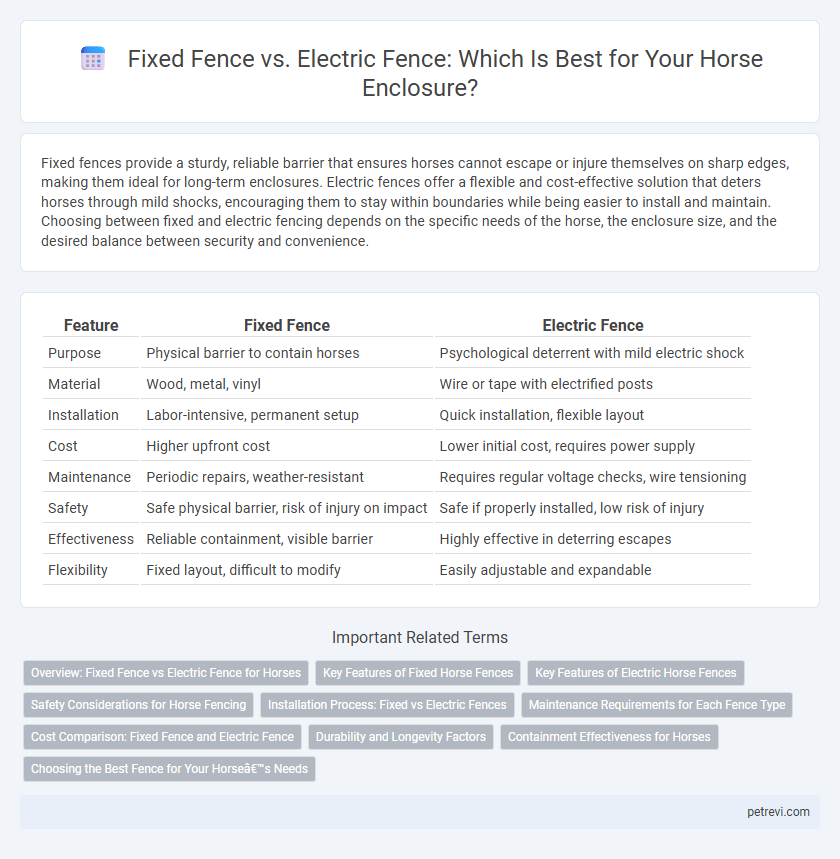Fixed fences provide a sturdy, reliable barrier that ensures horses cannot escape or injure themselves on sharp edges, making them ideal for long-term enclosures. Electric fences offer a flexible and cost-effective solution that deters horses through mild shocks, encouraging them to stay within boundaries while being easier to install and maintain. Choosing between fixed and electric fencing depends on the specific needs of the horse, the enclosure size, and the desired balance between security and convenience.
Table of Comparison
| Feature | Fixed Fence | Electric Fence |
|---|---|---|
| Purpose | Physical barrier to contain horses | Psychological deterrent with mild electric shock |
| Material | Wood, metal, vinyl | Wire or tape with electrified posts |
| Installation | Labor-intensive, permanent setup | Quick installation, flexible layout |
| Cost | Higher upfront cost | Lower initial cost, requires power supply |
| Maintenance | Periodic repairs, weather-resistant | Requires regular voltage checks, wire tensioning |
| Safety | Safe physical barrier, risk of injury on impact | Safe if properly installed, low risk of injury |
| Effectiveness | Reliable containment, visible barrier | Highly effective in deterring escapes |
| Flexibility | Fixed layout, difficult to modify | Easily adjustable and expandable |
Overview: Fixed Fence vs Electric Fence for Horses
Fixed fences, typically made from wood, vinyl, or metal, offer durable, solid boundaries ideal for containing horses safely and visually. Electric fences provide a cost-effective, flexible option with low maintenance, using mild shocks to deter horses from approaching the boundary. Both fencing types balance safety, strength, and visibility, with fixed fences excelling in physical barrier presence and electric fences offering adaptable, psychological deterrence.
Key Features of Fixed Horse Fences
Fixed horse fences typically consist of solid materials such as wood or metal, offering strong physical barriers that prevent horses from escaping and minimize injury risks. These fences provide high durability and often require less frequent maintenance compared to electric fences, ensuring long-term enclosure reliability. Their sturdy construction also offers excellent visual boundaries, which is crucial for horse safety and behavior management.
Key Features of Electric Horse Fences
Electric horse fences feature a low-impedance energizer that delivers consistent, safe pulses deterring horses without causing harm. These fences require minimal maintenance, offer easy installation, and provide flexible perimeter control with visible wires or tape that horses quickly learn to avoid. Their key advantage includes customizable voltage settings and integration with solar power systems for energy efficiency and reliability in remote locations.
Safety Considerations for Horse Fencing
Fixed fences provide a sturdy barrier that prevents horses from escaping while minimizing injury risks due to their solid construction and visibility. Electric fences act as psychological deterrents, delivering a mild shock that discourages horses from touching or trying to breach the enclosure, but improper installation or maintenance can increase injury risk. Prioritizing well-maintained materials, visible design, and appropriate height ensures optimal safety for horse enclosures in both fixed and electric fence systems.
Installation Process: Fixed vs Electric Fences
Fixed fences require durable post setting with concrete for stability, demanding more labor and time during installation. Electric fences involve quicker setup with lightweight materials such as polywire or tape, often utilizing existing posts to reduce groundwork. Both systems necessitate careful planning for safety and boundary effectiveness tailored to horse behavior and enclosure size.
Maintenance Requirements for Each Fence Type
Fixed fences require regular inspections for structural integrity, including checking for loose nails, rotting wood, or rusted metal to ensure safety. Electric fences demand frequent maintenance of electrical components such as chargers, wires, and insulators, along with vegetation control to prevent short circuits. Both fence types benefit from routine upkeep, but electric fences typically require more consistent attention to maintain effective voltage levels and horse containment.
Cost Comparison: Fixed Fence and Electric Fence
Fixed fences for horse enclosures typically involve higher initial material and labor costs due to durable wood or metal construction, averaging between $15 to $30 per linear foot. Electric fences offer a more affordable installation, with costs ranging from $1 to $3 per linear foot, but may incur additional ongoing expenses for electricity and maintenance. Evaluating long-term costs reveals fixed fences require less frequent repairs, while electric fences demand consistent upkeep to ensure functionality and horse safety.
Durability and Longevity Factors
Fixed fences for horse enclosures typically offer greater durability due to their robust materials like wood or metal, which withstand impact and weather conditions over time. Electric fences, while effective as a deterrent, often require more frequent maintenance and may degrade faster when exposed to harsh elements or physical damage from horses. Choosing a fixed fence generally ensures longer-lasting containment with fewer repairs, enhancing safety and cost efficiency for horse owners.
Containment Effectiveness for Horses
Fixed fences provide a solid physical barrier that effectively contains horses by preventing escape through sturdy materials like wood or metal, reducing the risk of injury. Electric fences use mild shocks to reinforce boundaries, teaching horses to respect the perimeter without permanent physical obstruction, which can be more flexible for large or irregularly shaped pastures. Combining both fence types often results in optimal containment, balancing physical durability with behavioral conditioning for better horse management.
Choosing the Best Fence for Your Horse’s Needs
Fixed fences offer durability and strong physical barriers ideal for containing horses safely, particularly in larger enclosures or pastures. Electric fences provide flexibility, cost-effectiveness, and psychological deterrence by delivering mild shocks that discourage horses from nearing boundaries. Assessing horse behavior, enclosure size, budget, and maintenance requirements is essential to selecting between fixed and electric fencing for optimal safety and containment.
Fixed Fence vs Electric Fence for Horse Enclosure Infographic

 petrevi.com
petrevi.com